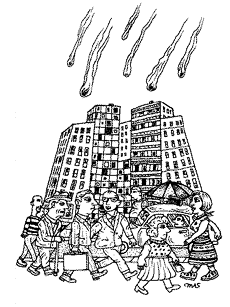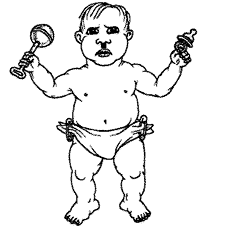
Movies
Armageddon (Touchstone Pictures). Critics napalm the summer's second Earth-meets-asteroid movie, "an assault on the eyes, the ears, the brain, common sense and the human desire to be entertained" (Roger Ebert, the Chicago Sun-Times). The Washington Post's Stephen Hunter finds it "so predictable it could have been written by a chimp." The most irksome aspects of Disney's $140 million spectacle: its jingoism, ear-splitting sound effects, trite one-liners, and unlikely premise--the planet's fate rests with redneck oil drillers. Dissenting, Slate's David Edelstein says the film got him "pumped, bellowing, pogoing backward up the aisle playing air guitar." (Clips are available at the official site.)
Henry Fool (Sony Pictures Classics). Indie auteur Hal Hartley's least mandarin and most likable film to date. A morality play about a garbage man's ascent to literary fame, it is deemed "a perfect modern parable" (Janet Maslin, the New York Times), with devastating send-ups of celebrity and the publishing world. Some critics complain it's pretentious--Camille Paglia plays herself--and so "self-conscious it feels uncomfortable with its own skin" (J. Hoberman, the Village Voice). (Click here for the official site.)
Death
Roy Rogers (1911-1998). A nostalgia fest for the Singing Cowboy, with obituaries declaring him a "soothing presence" (Mike Clark and David Zimmerman, USA Today) and "that almost unimaginable thing, the domestic cowboy" (the New York Times). Critics harp on his loyalty to wife Dale and horse Trigger and his tendency to express himself through ballads, not fisticuffs. The sociological spin: Boomers, the little buckaroos who worshiped RR, will now begin feeling their own mortality.

Books
Explaining Hitler: The Search for the Origins of His Evil, by Ron Rosenbaum (Random House). High praise for this explication of Hitler's explainers--profiles of the historians, journalists, and filmmakers who study the Führer. Rosenbaum's purpose: to show how portraits of Hitler reflect broader cultural assumptions. Critics revel in his elegant deflation of bunk theories, finding in his work "qualities in increasingly short supply in academic circles: old-fashioned moral rigor and plain old common sense" (Michiko Kakutani, the New York Times). Some regret that Rosenbaum does not proffer his own theory clarifying the mysterious origins of Hitler's evil. (In Slate, Alex Ross praises Rosenbaum's ironic style.)
Someone Else's House: America's Unfinished Struggle for Integration, by Tamar Jacoby (The Free Press). A predictably partisan response for a reporter's study of how guilty white liberals and black radicals exacerbated racial polarization in New York City, Detroit, and Atlanta. Conservatives slobber over Jacoby's conservative denunciations of affirmative action. As a dig at the left, they compare Jacoby's reportage favorably with Nicholas Lemann's in his liberal classic, The Promised Land. Meanwhile, liberals carp that her tone mirrors the anger of the black radicals she depicts.
Bridget Jones's Diary, by Helen Fielding (Viking). All the rage in Britain, this hilarious account of neurotic single women in London becomes the critical rage here. Seizing on Fielding's allusions to Pride and Prejudice, critics declare Diary an Austenlike comedy of manners that captures the Zeitgeist. They praise the protagonist's caustic humor for providing an antidote to her "perfectly coiffed ... American cousin Ally McBeal" (Tamsin Todd, the Washington Post Book World). Others find she shares McBeal's whininess and resembles a spouse "who prattles on incessantly, never asking a more challenging question than 'Do these pants make me look fat?' " (Stephanie Zacharek, Newsday). (Click here to read Slate's "Book Club" on Bridget Jones.)
Performance Art
The Return of the Chocolate Smeared Woman (The Flea, New York City). Performance artist Karen Finley reprises her 1990 show--she spread chocolate over her naked body--which made her the poster girl for right-wing denunciations of the National Endowment for the Arts. Most critics find her angry monologues about rape and Jesse Helms "obvious" and "dull" (Linda Winer, Newsday). Predictably, conservatives pronounce her smut unworthy of government funding. Less predictably, conservatives admit to attending her performance multiple times: "If new material has been added since her first chocolate-smeared headlines, it's not really apparent" (John Leo, U.S. News & World Report).
Recent "Summary Judgment" columns
Movie--Out of Sight;
Movie--SmokeSignals:
Movie--Dr. Dolittle;
Movie--Gone With the Wind;
Art--"Bonnard;"
Book--Suits Me: The Double Life of Billy Tipton, by Dianne Wood Middlebrook;
Book--The Notebooks of Don Rigoberto, by Mario Vargas Llosa, translated by Edith Grossman.
Movie--The X Files;
Movie--100 Years, 100 Movies (AFI);
Movie--Mulan;
Art--"Charles Ray;"
Book--Walking With the Wind: A Memoir of the Movement, by John Lewis, with Michael D'Orso;
Book--Ship of Gold: In the Deep Blue Sea, by Gary Kinder;
Book--A Beautiful Mind, by Sylvia Nasar.
Movie--Six Days, Seven Nights;
Movie--The Opposite of Sex;
Movie--High Art;
Theater--Not About Nightingales;
Television--The Magic Hour;
Book--Gain, by Richard Powers.
Movie--The Truman Show;
Movie--A Perfect Murder;
Movie--Kurt and Courtney;
Television--Sex and the City (HBO);
Theater--The Tony Awards;
Art--"Edward Burne-Jones, Victorian Artist-Dreamer";
Book--Cold New World, by William Finnegan.
--Franklin Foer
